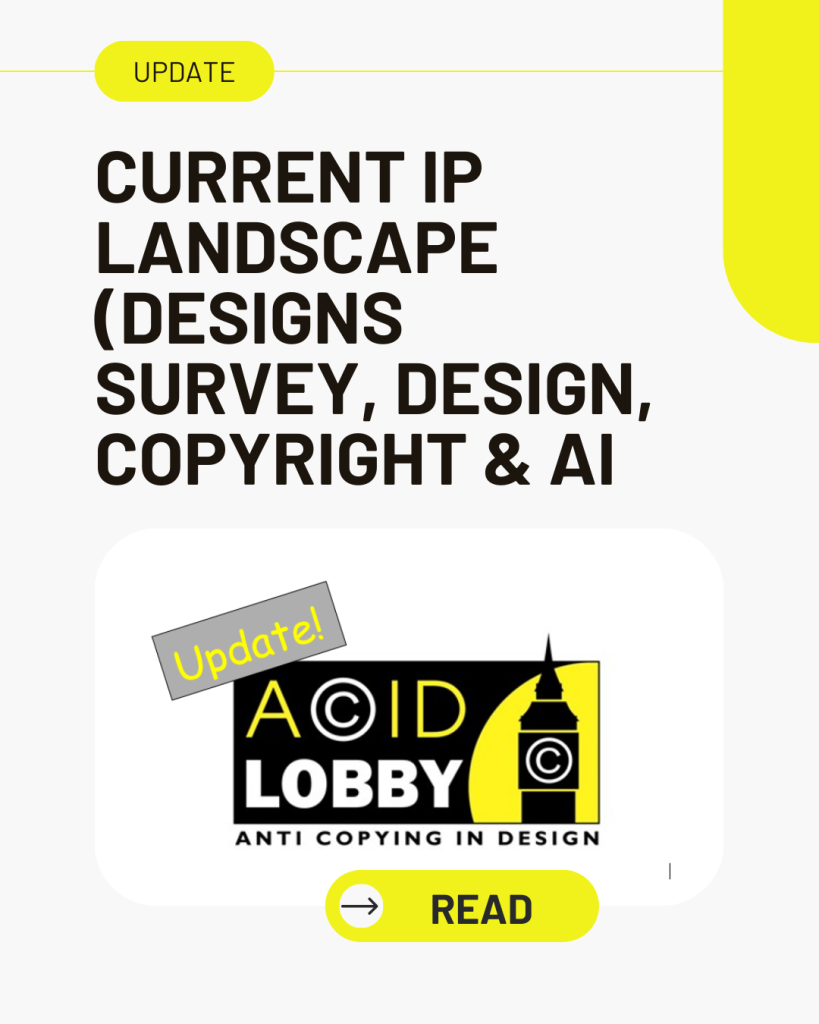

Copyright and AI Consultation Copyright & AI Consultation – Alliance Response here and ACID response here
Designs questionnaire Design Survey 2025 and a summary of the ACID response here
If you missed the recent ACID session on the survey, you can watch the full Design Survey Workshop here.
In summer 2025, government has promised a long-awaited Designs Consultation which ACID has been campaigning for many years. This is a rare opportunity to influence and shape the future of the designs and IP landscape for UK designers. The Intellectual Property Office (IPO) wants to know whether the current system meets the needs of IP creators.
Current IP Landscape, AI and copyright – There was an unprecedented response (over 11,000 submissions, Dec17 2024 – Feb 2025). The Government said the intention of the consultation was to seek views on a possible change to copyright law to:
The proposed change in copyright law. The main change to copyright law would allow generated AI (GAI) to use copyright for training purposes unless copyright creators “opted out”. To date there is no practical, workable, accessible “opt out” system, through licensing or other means to ensure transparency, safety, attribution or remuneration for content creators.
ACID AI and Copyright Consultation submission. Whilst ACID agrees with the government’s broad ambitions of growth, we have responded on specific arguments against any proposal to erode copyright law here, together with a more detailed response to the 47 questions as a member of the Alliance for Intellectual Property (IP) here.
Arguments against an erosion of copyright law. United with many, ACID is firmly against any erosion of UK copyright law for the free benefit of AI. No-one can deny the remarkable opportunities that AI offers but to progress the current government’s growth plan, AI and copyright and IP content creators must reside together in a safe landscape which is based on transparency to harness and grow our knowledge assets through ethical, legal and fair use which provides remuneration to both.
AI Growth & Opportunities Plan. On January 13 2025, it would appear the government had not even waited for the consultation to close before it announced a 50-point AI Growth and Opportunities Plan which, surprisingly, is based on the presumption that there will be a change in copyright law to allow this sign off, momentum and progress.
UK ambition as a global AI leader. The UK government’s AI Opportunities Action Plan aims to position the nation as a global leader in artificial intelligence by 2030. Key initiatives include a twentyfold increase in supercomputing capacity, establishment of AI Growth Zones to expedite innovation, and integration of AI into public services like healthcare and education. The plan also proposes granting AI companies access to anonymised NHS data to fuel AI development.
Caution. However, concerns have been raised regarding potential job displacement due to automation, the environmental impact of expanded data centres, and the adequacy of data privacy safeguards. Leaders within the creative industries have expressed fears that the plan could undermine creative copyright by allowing AI companies to use artists’ work without permission. Additionally, experts caution that the anticipated economic benefits may be overstated, and that successful implementation requires significant financial investment and a cultural shift within the government to prioritise AI technology and talent attraction.
Opposing views. A Make it Fair campaign, announced by the News Media Association (NMA) on 25 February 2024 is the start of an ongoing call to action against this governments proposals to change the UK’s laws to favour tech platforms so they can use British creative content to power their AI models without permission or payment unless the creators specifically say “no.” This is not about a choice between IP creators and AI it is about AI business paying for their training data just as they surely must pay for other services or access to content, It is not about one side “winning”. See latest Government’s ambition that “The UK is an AI maker, not a taker” is anomalous given it intends to allow AI to “take” valuable content without permission, a sanitised word for theft.

ACID comment, “Whilst recognising the untold advantages of ethical AI in any growth strategy it cannot be at the cost of the creative industries and other copyright content creators.
Big Tech has the best chance of succeeding in the UK if creative concerns are recognised and respected so they can focus on developing Ai technology in the UK and are not handicapped by fighting creators in court actions and in PR campaigns. Look at Stability and Getty – even judges are confused!
Evidence. ACID is a member of the Creative Rights and AI Coalition which has commissioned Bradshaws to undertake research to underpin the value of IP to the UK and the economic, societal and fiscal consequences of any further change to copyright law. Strong evidence will form part of the armoury to give credibility to our stance on this issue.
Current Legislation. The Data (Use and Access) Bill The government was defeated in the Lords over measures to protect IP creators from having their copyright work used to train AI models without permission or remuneration. However, at Committee Stage, on March 11, in the House of Commons, the Lords’ amendments were overturned. There is an opportunity before the Report Stage (in May) for organisations to submit their reports.

Culture Minister Chris Bryant told MPs during the debate,
“We have heard loud and clear the message that stakeholders do not want us to rush to legislate on this topic and we intend to heed that message.”
Guidelines on mitigating risk factors and creating industry standard guidelines for employees are in draft at the moment, ACID will work collaboratively with all organisations interested in creating help, tips and guidelines to navigate their way through the various options to develop and sustain best practice.

Spread the Word

Latest News





Newsletter Sign-Up
| Cookie | Duration | Description |
|---|---|---|
| cookielawinfo-checkbox-analytics | 11 months | This cookie is set by GDPR Cookie Consent plugin. The cookie is used to store the user consent for the cookies in the category "Analytics". |
| cookielawinfo-checkbox-functional | 11 months | The cookie is set by GDPR cookie consent to record the user consent for the cookies in the category "Functional". |
| cookielawinfo-checkbox-necessary | 11 months | This cookie is set by GDPR Cookie Consent plugin. The cookies is used to store the user consent for the cookies in the category "Necessary". |
| cookielawinfo-checkbox-others | 11 months | This cookie is set by GDPR Cookie Consent plugin. The cookie is used to store the user consent for the cookies in the category "Other. |
| cookielawinfo-checkbox-performance | 11 months | This cookie is set by GDPR Cookie Consent plugin. The cookie is used to store the user consent for the cookies in the category "Performance". |
| viewed_cookie_policy | 11 months | The cookie is set by the GDPR Cookie Consent plugin and is used to store whether or not user has consented to the use of cookies. It does not store any personal data. |